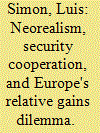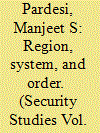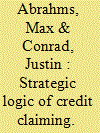|
|
|
Sort Order |
|
|
|
Items / Page
|
|
|
|
|
|
|
| Srl | Item |
| 1 |
ID:
153952


|
|
|
|
|
| Summary/Abstract |
Protecting civilians from conflict and atrocities has become a major focus of governments, the UN, and activists. Yet peace operations—the main policy instrument for directly shielding civilians from violence—vary widely in how well they are designed to do so. One much-maligned problem is a gap between a force's ambitions to protect civilians and its physical resources for doing so. Missions plagued by these ambitions–resources gaps gesture toward protecting civilians but are not designed to do so effectively. They can also worsen civilian suffering. This article explores the politics behind these gaps, focusing on the role of powerful states—especially major Western democracies—in creating and facilitating them. It argues that ambitions–resources gaps represent a form of organized hypocrisy that helps political leaders balance competing normative and material pressures to protect civilians while limiting costs and risks. Case studies of France's Operation Turquoise in Rwanda and US support for the African Union Mission in Sudan (AMIS) in Darfur support the argument.
|
|
|
|
|
|
|
|
|
|
|
|
|
|
|
|
| 2 |
ID:
153951


|
|
|
|
|
| Summary/Abstract |
Most neorealists argue that relative decline constitutes a systemic incentive for European security cooperation. Although this claim is broadly accepted, I argue that the relationship between relative decline and European security cooperation is complicated by a number of factors. First, European calculations about relative decline bear both a global and a regional (that is, intra-European) component. If a European country is to effectively mitigate relative decline, cooperation is not sufficient. It is just as important that cooperation develops in a way that underscores that country's comparative strengths and minimizes its weaknesses. In this regard, European countries are often in direct competition with each other. Secondly, when Europeans are thinking about their relative power position, some countries matter more than others: a given European country may accept to incur a relative loss vis-à-vis another country (European or otherwise) but not others. These calculations are further complicated by issue linkage. Some countries may accept relative losses on some issues (for example, security) in exchange for gains on others (economic). This article examines how intra-European considerations of relative gains affect the way in which Europe's main powers seek to cope with relative decline and assesses how those considerations affect security cooperation in a European Union (EU) framework. In doing so, it aims to unpack the otherwise vague notions of relative decline and European security cooperation.
|
|
|
|
|
|
|
|
|
|
|
|
|
|
|
|
| 3 |
ID:
153958


|
|
|
|
|
| Summary/Abstract |
Prior studies find that military dictatorships display a high propensity to initiate militarized interstate disputes (MIDs). Yet, there is little agreement on which feature of military regimes can best explain this behavior. This article distinguishes between three potential causes: coup risk, the dictator's affiliation with the military, and the military's influence on politics. Using recent data on authoritarian regimes, I find that, whereas coup risk is a strong predictor of conflict initiation, the dictator's affiliation does not affect his foreign policy. Furthermore, I find tentative evidence that the military's influence on domestic politics has a negative effect on MID initiation. These findings thus challenge the view that military regimes' foreign policy is due to the military's organizational culture: the relationship between military regimes and dispute initiation seems to be due to factors that simply happen to add up in military autocracies but are essentially unrelated to regime type.
|
|
|
|
|
|
|
|
|
|
|
|
|
|
|
|
| 4 |
ID:
153953


|
|
|
|
|
| Summary/Abstract |
This article introduces early modern Islamicate Asia (∼1500–1750) as an international system. Three theoretical insights emerge from an analysis of the international relations of the Mughal Empire, the system's largest polity/economy. First, hierarchies are not necessarily peaceful because the system's structural attributes—polarity, the presence/absence of regions, and the pattern of interunit relations—remain important causal factors. Second, asymmetric material capabilities do not imply unequal relationships because the initiation of state-making policies that others emulate enhances the structural power of the initiator. Finally, systemic stability is reinforced when the interaction of trade, finance, and military power affirm the system's economic and security orders. These findings have implications for the expansion of Europe, for the study of world history, and for the emerging world order.
|
|
|
|
|
|
|
|
|
|
|
|
|
|
|
|
| 5 |
ID:
153954


|
|
|
|
|
| Summary/Abstract |
In theory, terrorism is a political communication strategy for groups to convey their grievances and the costs of ignoring them. In practice, though, terrorist groups take responsibility for just a small portion of their attacks. Rather than getting credit for the violence, terrorist leaders generally deny their operatives committed it. This theoretical and empirical disconnect may explain why scholars have ignored the subject of unclaimed attacks despite these being the norm. With a mixed-methods research design, our study helps to fill this lacuna by proposing and testing a new theory to help account for variation in which attacks are claimed.
|
|
|
|
|
|
|
|
|
|
|
|
|
|
|
|
| 6 |
ID:
153955


|
|
|
|
|
| Summary/Abstract |
A deeper understanding of terrorist disengagement offers important insights for policymakers and practitioners seeking to persuade individuals to leave these groups. Current research highlights the importance of certain “push” and “pull” factors in explaining disengagement. However, such studies tell us very little about the relative frequencies at which these hypothesized factors are associated with leaving in the terrorist population. Using data collected from eighty-seven autobiographical accounts, we find that push, rather than pull, factors are more commonly cited as playing a large role in individuals' disengagement decisions and that the experience of certain push factors increases the probability an individual will choose to leave. Importantly, disillusionment with the group's strategy or actions, disagreements with group leaders or members, dissatisfaction with one's day-to-day tasks, and burnout are more often reported as driving disengagement decisions than de-radicalization. Finally, our results suggest that ideological commitment may moderate one's susceptibility to pull factors.
|
|
|
|
|
|
|
|
|
|
|
|
|
|
|
|
|
|
|
|
|